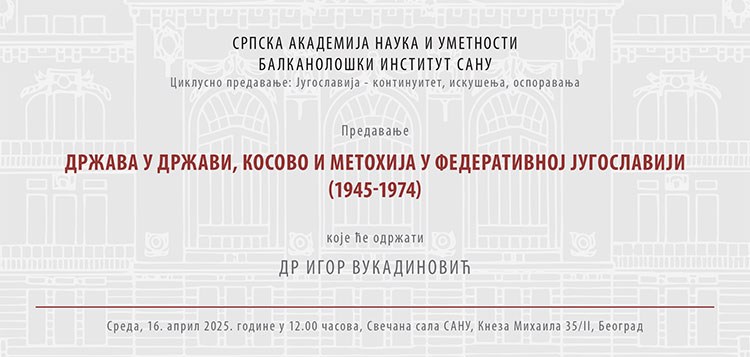Lecture series ‘A State within a State: Kosovo and Metohija in Federative Yugoslavia (1945-1974)
As part of the lecture series ’Yugoslavia – Continuity, Trials, and Challenges, Dr Igor Vukadinović will give the lecture titled ‘A State within a State: Kosovo and Metohija in Federative Yugoslavia (1945-1974)’ on Wednesday, 16 April, at noon, at the SASA Grand Hall.
The lecture will analyse various aspects of the history of Kosovo and Metohija within Yugoslavia under the communists. The post-war establishment of Kosovo and Metohija’s autonomy in Serbia was a significant political precedent, diverging from the approaches of neighbouring countries in similar situations. This move, coupled with measures including the amnesty of Albanian wartime quislings, property confiscation from interwar Serbian settlers and their expatriation from Kosovo and Metohija, undermined Serbia’s position in the newly formed Yugoslav federation.
The processes initiated following the Second World War additionally intensified in the late 1950s when the Yugoslav leadership launched the process of further political and economic strengthening of the autonomy. The political campaign after Aleksandar Ranković’s removal in 1966 and the 1968-1974 Constitutional reform certainly turned the province’s autonomy into a kind of Albanian statehood within Yugoslavia. As a result, Serbia lost the ability to manage the status of its autonomous provinces independently, placing it in an unequal position compared to other Yugoslav republics. Another major consequence of this new political structure was the mass exodus of the Serbian population from the province.
The use of Kosovo’s autonomy as a means of Serbia’s weakening became fully evident in the 1980s when the attempts of Serbian leaders to curb the process of emigration and recover a part of the republic’s jurisdiction in autonomous provinces were met with fierce resistance. The destabilization and problems in Kosovo had a decisive influence on Serbia’s inability to prevent the collapse of Yugoslavia or at least mitigate its scope and consequences.
Igor Vukadinović is a research associate at the Institute for Balkan Studies of SASA. He completed his graduate and master’s studies at the Faculty of Philosophy in Belgrade. His doctoral thesis he defended in 2020 at the Department of History of the Faculty of Philosophy of the University of Belgrade. He has been focused on Yugoslavia and contemporary Serbian history, with a particular focus on Kosovo and Metohija’s autonomy and Serbian-Albanian relations.
He received the Ilarion Ruvarac Award for history from Matica Srpska in 2021 for his monograph titled ’Autonomy of Kosovo and Metohija in Serbia (1945-1969).’

